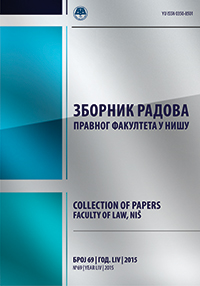СУД ПРАВДЕ ЕВРОПСКЕ УНИЈЕ ПОСЛЕ
ЛИСАБОНСКОГ УГОВОРА
THE EUROPEAN UNION COURT OF JUSTICE AFTER THE TREATY OF LISBON
Author(s): Zoran RadivojevićSubject(s): Law, Constitution, Jurisprudence
Published by: Правни факултет Универзитета у Нишу
Keywords: Court of Justice; General Court; specialized courts; Treaty of Lisbon; judicial integration; emergency procedure; control of legality; access to justice; judicial control
Summary/Abstract: Created by the Treaty of Paris as a judicial authority which ensures respect for the law when interpreting and applying this treaty, the European Court of Justice has so far been repeatedly reformed. The latest reform of the judicial system of the European Union, put into effect by the Lisbon Treaty, largely relies on solutions contained in the unaccepted Treaty on the Constitution for Europe. Novelties that this treaty brings could be grosso modo divided into several basic categories. First, there are organizational changes related to the different name and composition of the courts, appointment of judges and advocates-general and the formation of specialized courts. The new terminology and organization aims to provide a clear distinction between the Court of Justice of the EU, which is an aggregate term or generic designation for the entire judicial system of the Union, and special judicial bodies that enter into its composition. These are the Court of Justice as the highest authority, the General Court which is actually the renamed Court of First Instance, and specialized courts that replaced the judicial panels. The second category includes changes that expand the jurisdiction of the Court to certain new areas owing to the abolition of the former EU pillar structure and the dissolution of the European Community. On such a basis, an integration of court jurisdiction regarding the first and third pillar ensued, as the Court of Justice was vested with general and compulsory jurisdiction over the entire law created in the newly established area of freedom, security and justice. The exception is the area of common foreign and security policy, in which the Court’s jurisdiction still remains excluded. The third type of amendment extends the scope of judicial reviews of the validity of acts adopted by EU institutions and enables authorized subjects an easier access to the Court. Their aim is to strengthen the rule of law within the legal system of the Union, given that the action for annulment is the basic means to exercise judicial review of the institutions’ activities. The last set of changes introduced by the Lisbon Treaty refers to faster proceedings in deciding on preliminary rulings in certain areas when the interested person, whose position depends on the interpretation of EU law, is in custody. In addition, it allows for more effective judicial control in cases of default judgment or failure to fulfill commitments by Member States through the acceleration and simplification of the procedure for imposing financial sanctions.
Journal: Зборник радова Правног факултета у Нишу
- Issue Year: LV/2016
- Issue No: 73
- Page Range: 25-44
- Page Count: 19
- Language: Serbian

